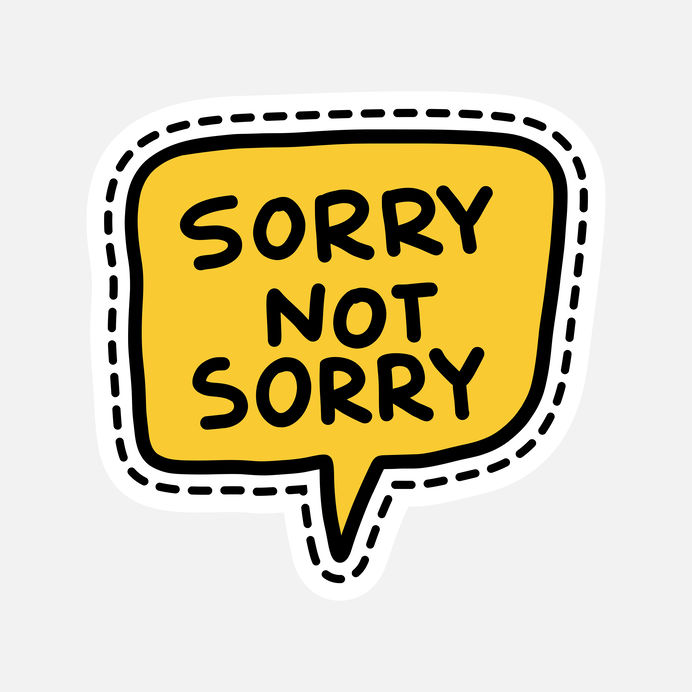Saying "I'm Sorry" Too Often

A sincere apology or “I’m Sorry” shows concern for being in right relationship, shows personal responsibility, and shows your intention to correct a situation. It also means that you intend not to do whatever it is that you’ve done to cause harm again in the future.
But we can get caught up in saying “sorry” too often. You may have caught yourself or been fortunate enough to have a good friend give you a head’s up on this bad habit of overworking an expression when it isn’t an apology at all.
- “I’m sorry, but it wasn’t all my fault.”
Be wary, generally, of the template for excuse-making: “I’m sorry, BUT…” - “Oh sorry, I was going to do that later.”
Excusing yourself for a task undone. - “I’m sorry to bother you.”
An important interruption doesn’t need apology. “Sorry for interrupting” can come across as begging for attention. - “Oh, I’m sorry—it’s okay that you forgot that we had dinner arrangements.”
Letting someone off the hook by claiming her mistake or regret as your own. - “You misunderstand me! I’m sorry, but you do.”
Accusing, then applying pressure without claiming your emotion. - “Yes, I’ve made the same mistake again and you know that I’m sorry.”
Building into an excuse with mind-reading anticipated apology. - “I’m sorry, next time try a different approach with me.”
Masking a desire of need to be treated differently. - “Honey, I’m really sorry this is hard work, and you don’t need to do it now.”
Letting a child off the hook for an assignment.
A Telling Question: “Why are you saying you’re sorry?”
When your co-worker or friend asks, “Why are you saying you’re sorry?” and even seems a little put off or frustrated by it, an opportunity presents itself to reconsider how you are expressing concern for others. Maybe there are less confusing ways to show concern and desire to help or care for someone or a situation.
Instead of saying, “I’m really sorry about the weather today, as our event will be different,”
say, “Our outing itinerary has changed to help make the best of our weather conditions.”
Instead of saying “I’m sorry for having to do that 3 times!”
say, “Thank you for pointing out that I hadn’t completed this according to specifications.”
Instead of saying, “I’m sorry that I haven’t sent the update by now,”
say, “Thank you for your patience in this slow down. I will get it to you as soon as possible.”
When you’re showing a Power Point presentation on Zoom and someone asks you to show a slide one more time, skip saying, “Oh, sorry, sure.”
Instead say, “Of course” or “My pleasure.”
Keeping your dignity, getting your job done, and being in right relationship calls for eliminating the too many “I’m sorrys.”
Taking Responsibility with No Apologies
“Sorry” has it’s place, but it is an overused word because it lets us off the hook from knowing and expressing our true intentions and desires.
- You want to talk to your spouse about something he may feel uncomfortable about, but don’t realize being polite means being truthful, too. Skip the, “Sorry, I know we’ve tried to talk about this before.”
- You want the boss’s time, but instead of saying, “Sorry to bother you,” go with a more professional, “When is a good time to talk?”
- “Karl, I need to complete something else first and I will get to this right afterward. Is that okay?” beats “Karl, sorry, but I will need a little more time on this.”
Being etiquette-ful means accepting personal responsibility. It’s never too soon to get rid of the excuse-making habit. Too many “I’m sorrys” gives others the impression that you can’t really be counted on. Instead of giving reasons why something can’t be done, state the problem and give your action steps to solving it.
There are so many things in life that we don’t have control over. Saying “sorry” too much for these things doesn't help others know they can rely on you for the bigger things that you do have control over.














